MercoPress. South Atlantic News Agency
Tag: British Antarctic Survey (BAS)
-
Thursday, February 5th 2026 - 00:36 UTC
The RRS Shackleton incident when an Argentine destroyer opened fire on the research vessel

On this day but in 1976 a very serious incident occurred in the South West Atlantic when the British research vessel RRS Shackleton was intercepted and fired upon by the Argentine destroyer ARA Almirante Storni, some 78 miles south of Cape Pembroke in the Falkland Islands.
-
Wednesday, January 21st 2026 - 13:16 UTC
UK investment in Antarctica underlines role as a leading polar research nation
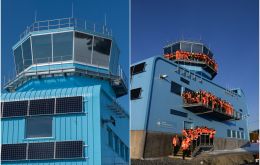
A major new British Antarctic Survey (BAS) facility at Rothera Research Station is being presented as evidence of the UK’s standing in polar research. The £100 million Discovery Building—together with a new services network at Rothera—has been formally opened by BAS Director Professor Dame Jane Francis, completing what BAS describes as the largest UK construction project ever carried out in Antarctica.
-
Monday, November 17th 2025 - 21:16 UTC
Avian flu decimates seal elephant population in South Georgia; few survivors emerge in Uruguayan beaches
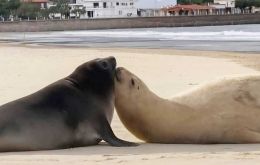
In the last few months there have been at least twenty incidents of elephant seals emerging along Uruguayan beaches, both females and males, and allegedly they belong to “deep South species”, according to local environmental and animal protection organizations such as “FaunaMarinaSOS”.
-
Monday, November 3rd 2025 - 19:52 UTC
Discovery Building, a milestone for Rothera Base and BAS in Antarctica

The 2025/2026 Antarctic season is a landmark for the British Antarctic Survey (BAS) and its Antarctic Infrastructure Modernization Project (AIMP), as the new Discovery Building begins to take on its operational role. Specialist teams will be on site from this month to check the building’s critical systems are working as expected and to carefully manage the removal of six older structures, the functions of which are now integrated within the Discovery Building.
-
Tuesday, August 12th 2025 - 06:40 UTC
Antarctic researcher remains, working for Falklands’ Dependency, 66 years ago, found in receding glacier

The remains of an Antarctic researcher have been discovered by a Polish team among rocks exposed by a receding glacier in Antarctica. They are identified by DNA as those of Dennis ‘Tink’ Bell, a 25 year-old meteorologist who was working for the Falkland Islands Dependencies Survey (FIDS), the predecessor of the British Antarctic Survey (BAS). He died in a crevasse on a glacier at Admiralty Bay on King George Island, situated off the Antarctic Peninsula on 26 July 1959. His body was never recovered.
-
Saturday, August 2nd 2025 - 08:30 UTC
BAS research links ocean tides when Antarctica icebergs calve

A new study has revealed that ocean tides can directly influence when large Antarctic icebergs break off from the ice shelves surrounding the continent, a process known as calving. The research marks a major step toward accurately forecasting ice loss from the Antarctic Ice Sheet and improving projections of global sea level rise.
-
Wednesday, June 18th 2025 - 05:27 UTC
Antarctica Emperor penguin population decreasing faster than expected, satellite imagery
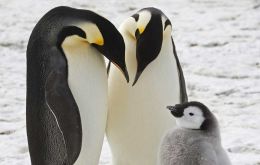
Antarctica’s emperor penguin population may be decreasing faster than some of the most pessimistic predictions. A new analysis of up-to-date satellite imagery suggests the birds’ numbers declined 22% over a 15-year period (2009 to 2024) in a key sector of the continent – encompassing the Antarctic Peninsula, Weddell Sea and Bellingshausen Sea.
-
Wednesday, June 11th 2025 - 08:11 UTC
The plastic legacy has reached profusely to the bottom of the planet

On 5 June, UN World Environment Day, the campaign motto was “Beat Plastic Pollution”, and with very good reasons, we are surrounded by plastic pollution and a report from BAS indicates that at the bottom of the world, where few humans have ever set foot, an unwelcome visitor has arrived. Antarctica – the vast, frozen wilderness of ice and snow – is no longer untouched by humanity’s most persistent pollutant: plastic.
-
Thursday, May 29th 2025 - 14:49 UTC
Forty years since the discovery of the ozone hole by a team of BAS scientists
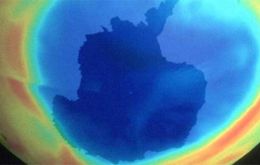
This month, the world will mark the 40th anniversary of a moment that changed the course of history: the publication in Nature of ground-breaking research that presented the discovery of the ozone hole more precisely on 16 May 1985.
-
Thursday, April 24th 2025 - 06:13 UTC
Talks on discovery in Antarctica of the ozone hole 40 years ago at Royal Geographic Society
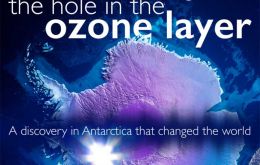
To commemorate the extraordinary moment the ozone hole was discovered in Antarctica 40 years ago, British Antarctic Survey (BAS) has teamed up with the Royal Geographical Society (RGS) in London to host a special series of talks on Tuesday, 6 May 2025.
